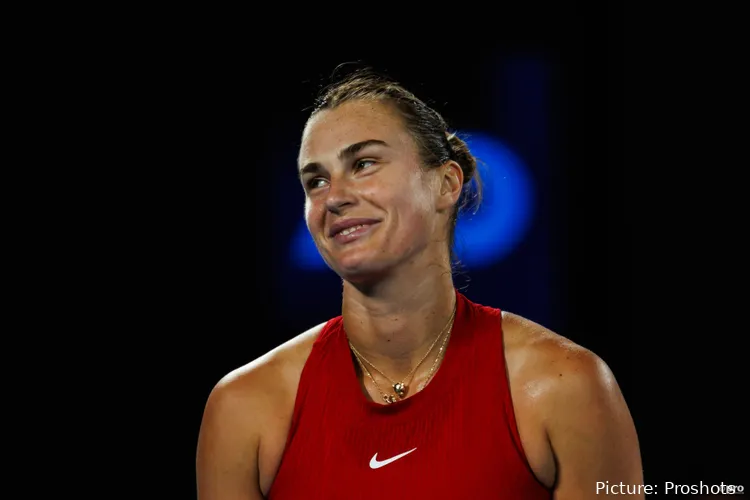
The Brisbane International witnessed a dramatic and emotionally charged moment as Aryna Sabalenka, known for her fiery passion and aggressive playstyle, let her frustrations boil over during a critical match. The Belarusian star’s outburst, which involved smashing her racket, not only highlighted the intense pressure of top-tier tennis but also seemed to amuse her Kazakh opponent, who capitalized on the psychological shift to gain an upper hand. The incident has become a focal point of discussions, illustrating the high stakes and raw emotions that characterize professional tennis.
Sabalenka entered the tournament as one of the favorites, with her powerful serve and groundstrokes making her a formidable opponent on any surface. Her consistent performances throughout 2024, including a Grand Slam triumph and a dominant display at the WTA Finals, solidified her reputation as one of the most intimidating players on the tour. However, the match in Brisbane revealed a different side of Sabalenka—a player grappling with the mental toll of competition and the pressure to maintain her elite status.
The tension began building early in the match as Sabalenka struggled to find her rhythm. Her usually reliable serve faltered, resulting in double faults at critical junctures. Meanwhile, her Kazakh rival, composed and opportunistic, seized the momentum with precise shot placement and a steady baseline game. As unforced errors piled up on Sabalenka’s side, frustration visibly grew. Her body language became increasingly agitated, and a missed break point opportunity midway through the second set proved to be the tipping point.
In a moment that stunned the crowd, Sabalenka smashed her racket on the court with such force that it shattered, prompting gasps from spectators. The act, while not uncommon in the high-stakes world of tennis, was a rare display of vulnerability from a player known for her steely determination. The incident drew a mixed reaction: some fans expressed sympathy, understanding the immense pressure athletes face, while others criticized the outburst as unsportsmanlike.
Her opponent, unfazed by the spectacle, appeared to use the incident to her advantage. The Kazakh player maintained her focus, seemingly energized by Sabalenka’s emotional unraveling. She delivered a series of stunning winners, drawing applause from the crowd and widening her lead. Observers noted how the shift in dynamics played into the hands of the underdog, who displayed remarkable poise and resilience against a higher-ranked opponent.
The match ended in an upset, with the Kazakh player clinching a hard-fought victory. While Sabalenka showed flashes of brilliance in her aggressive baseline play and powerful returns, her inconsistency ultimately cost her the match. In the post-match handshake, the Kazakh player’s subtle smirk hinted at her satisfaction, not just with the victory but with how she managed to navigate and perhaps exploit the emotional turbulence of her opponent.
This incident raises broader questions about the mental challenges faced by professional athletes. Sabalenka’s outburst is a stark reminder of the psychological strain that accompanies the pursuit of excellence at the highest level. The physical demands of the sport are immense, but the mental game is equally, if not more, taxing. Players must cope with expectations, both self-imposed and external, while performing under the scrutiny of millions of fans and critics.
For Sabalenka, this match will likely serve as a learning experience. Despite the loss, she remains one of the most talented players on the tour, with the ability to bounce back stronger. Her team, including her coach and sports psychologist, will undoubtedly work with her to address the mental aspects of her game, ensuring she can channel her emotions constructively in future matches. Sabalenka has previously shown remarkable resilience in overcoming setbacks, and this incident is unlikely to define her season.
The Kazakh player’s performance, on the other hand, is a testament to the importance of mental toughness and adaptability in tennis. By staying composed and capitalizing on her opponent’s vulnerability, she demonstrated the qualities that make an underdog dangerous in high-pressure situations. Her victory in Brisbane could serve as a springboard for greater success, boosting her confidence as she progresses through the tournament and the rest of the season.
The match also reignites discussions about sportsmanship and the role of emotions in professional sports. While outbursts like Sabalenka’s are not uncommon, they often polarize opinions. Some view such moments as a natural expression of passion and frustration, integral to the human side of sports. Others argue that players, as role models, should strive to maintain composure, setting an example for younger athletes and fans.
As the Brisbane International continues, all eyes will remain on Sabalenka to see how she responds to this setback. Her journey forward will be closely watched, as fans and analysts alike look for signs of her trademark resilience and ability to rise above challenges. Meanwhile, the Kazakh player’s triumph adds an exciting narrative to the tournament, showcasing the unpredictability and drama that make tennis such a captivating sport.
In the broader context of the WTA tour, this match serves as a microcosm of the intense competition and emotional highs and lows that define the life of a professional tennis player. For Sabalenka and her Kazakh rival, the encounter in Brisbane is more than just a match—it’s a chapter in their respective careers, filled with lessons, growth, and the relentless pursuit of excellence. Whether it’s through moments of triumph or instances of frustration, both players have left an indelible mark on this tournament, reminding fans why tennis remains one of the most compelling sports in the world.
Leave a Reply